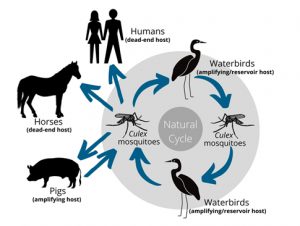Currently, there is evidence of Japanese Encephalitis Virus (JEV) circulation in pigs in South-Eastern Queensland, New South Wales, Northern Territory, Victoria and South Australia – (Link)
Safe Work Australia has developed new work health and safety (WHS) guidance on Japanese encephalitis for persons conducting a business or undertaking.
Japanese encephalitis is caused by the Japanese encephalitis virus (JEV). It is spread through mosquito bites and is more common in areas of increased mosquito activity.
Infection in humans is usually asymptomatic, but on rare occasions it can result in severe disease such as encephalitis (infection of the brain) and even death.
JEV spreads when a human is bitten by a mosquito that has previously bitten a pig or a wild waterbird infected with the virus. Japanese encephalitis has been detected in parts of South-Eastern Queensland, New South Wales, Northern Territory, Victoria and South Australia.
How is it transmitted to people?
Humans become infected when bitten by a mosquito that has previously bitten a pig or a wild waterbird that was infected with the virus.
Although horses are susceptible to infection, if near a source of JEV-infected mosquitoes, they are considered dead-end hosts. This means that while they can become infected with JEV, they cannot pass on infection to other horses or people.
The virus cannot be transmitted from human to human, or by eating meat from an infected animal.
Who is at risk?
Workers in these areas who work with or close to pigs and those exposed to mosquitoes while at work, such as those who work outdoors are at greater risk of infection, unless they have been vaccinated or have prior immunity.
SafeWork Australia Guidance
If you are a person conducting a business or undertaking (PCBU) in an area where Japanese encephalitis is a concern, you must do everything that is reasonably practicable to eliminate the risk of workers and visitors contracting it. Where you are unable to eliminate the risk, you must do everything that is reasonably practicable to minimise it.
To minimise risks, you must implement all reasonably practical control measures such as:
- encouraging or ensuring vaccination, particularly if your workers have been identified as part of a group for priority vaccination.
- avoiding or minimising working outside where possible, especially dusk/evening and dawn when mosquitos are most active.
- eliminating mosquito breeding sites around the workplace where possible, including removing any debris which may collect standing water.
- ensuring workers avoid contact with bodily fluids and tissues of potentially infected animals, or if this is not possible, ensure workers have appropriate training in handling potentially contaminated animals and are provided with appropriate personal protective equipment such as masks, eye protection and gloves.
- installing insect screens on windows, doors, vents and other entrances.
- using insecticide sprays, vapour dispensing units (indoors) and mosquito coils (outdoors) to clear rooms or repel mosquitoes from an area, and
- protecting workers and others at the workplace from being bitten by mosquitoes.
You must also provide information to workers on the risks and symptoms of Japanese encephalitis, and train workers in the use of controls.
For more information see Japanese encephalitis: duties of employers under the model WHS laws.


